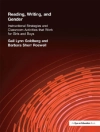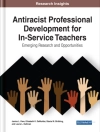‘Grounded in the field of adult education, this international compilation offers a range of critical perspectives on popular culture as a form of pedagogy. Its fundamental premise is that adults learn in multiple ways, including through their consumption of fiction. As scholars have asserted for decades, people are not passive consumers of media; rather, we (re)make our own meanings as we accept, resist, and challenge cultural representations.
At a time when attention often turns to new media, the contributors to this collection continue to find “old” forms of popular culture important and worthy of study. Television and movies – the emphases in this book – reflect aspects of consumers’ lives, and can be powerful vehicles for helping adults see, experience, and inhabit the world in new and different ways.
This volume moves beyond conceptually oriented scholarship, taking a decidedly research-oriented focus. It offers examples of textual and discursive analyses of television shows and films that portray varied contexts of adult learning, and suggests how participants can be brought into adult education research in this area. In so doing, it provides compelling evidence about the complexity, politics, and multidimensionality of adult teaching and learning.
Using a range of television shows and movies as exemplars, chapters relate popular culture to globalization, identity, health and health care, and education. The book will be of great use to instructors, students, and researchers located in adult education, cultural studies, women’s and gender studies, cultural sociology, and other fields who are looking forinnovative ways to explore social life as experienced and imagined.’
Tabela de Conteúdo
Introduction: Approaching Popular Culture as Pedagogy; Doctor Who Fandom, Critical Engagement, and Transmedia Storytelling: The Public Pedagogy of the Doctor; Learning How to Build Community without Following the Instructions: Finding Pieces of Resistance in The Lego Movie; Teachers on Film: Changing Representations of Teaching in Popular Cinema from Mr. Chips to Jamie Fitzpatrick; Discourse Analysis of Adult and Workplace Learning in Nurse Jackie: Exploring Learning Processes within a Knowledge Culture; Giving Substance to Ghostly Figures: How Female Nursing Students Respond to a Cultural Portrayal of “Women’s Work” in Health Care; Narratives of Illness in South African Cinema: What Can Popular Culture Teach Us about HIV?; Pedagogies of Gender in a Disney Mash-up: Princesses, Queens, Beasts, Pirates, Lost Boys, and Witches; How to be a Woman: Models of Masochism and Sacrifice in Young Adult Fiction; Contributors; Name Index; Subject Index.












